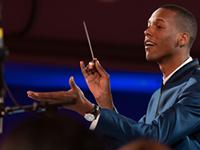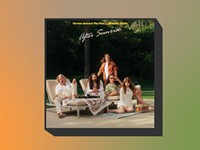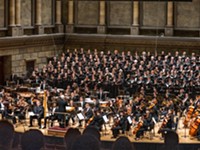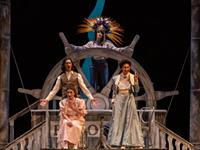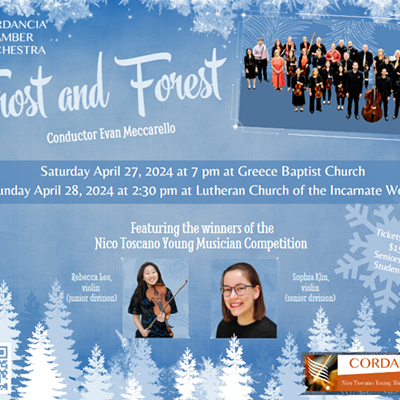[
{
"name": "500x250 Ad",
"insertPoint": "5",
"component": "15667920",
"parentWrapperClass": "",
"requiredCountToDisplay": "1"
}
]
Music Director Ward Stare kick-started the 2018-19 Rochester Philharmonic Orchestra season last night, with music by three composers well within his comfort zone and that of the RPO audience: Berlioz, Prokofiev, and Dvořák. The program also followed the well-worn template of overture/concerto/symphony. However, when the program turns out to be an engaging one, and the musicians - including a powerhouse soloist - acquit themselves so well, that familiar template is very satisfying.
What opera (not written by Beethoven) has two overtures? The only one I can think of offhand is Hector Berlioz's "Benvenuto Cellini." This dashing comedy has a proper overture at the beginning; and Berlioz later turned the opera's second act opening, sans singing, into the famous "Roman Carnival" Overture. This piece is the very definition of orchestral flair, an ideal concert opener. It is also a virtuosic whirlwind for the orchestra, and Stare and the RPO hit just the right tone: heady and brilliant, but also unforced, perfect for the music's energy and wit.
The version of Prokofiev's Piano Concerto No. 2 that we know is a revision of an earlier, lost concerto that apparently shocked its original audiences (one early critic opined, "The cats at home make better music than this!"). Concerto 2.0 is probably a toned-down version, but it's still very Prokofiev-like - its four movements are a potent combination of the traditional and the wacky.
It is not much longer than a Mozart concerto, but it seems huge, a wild ride with something for everybody. The piece includes melodies that Rachmaninoff wouldn't have minded writing, delirious dissonances, take-no-prisoners prowess, and a third movement that the great pianist Sviatoslav Richter compared to a dragon devouring its young. Judging from the music's shrieking piccolos and malevolent tuba blasts, Richter got it right (it's too bad Prokofiev wasn't around to write the score for "Jurassic Park").
Yefim Bronfman has recorded all of Prokofiev's piano concertos, so this work is definitely in his comfort zone. He just seems to sit down, and out of his fingers come bazillions of notes - perfectly paced, sonorous, splendidly articulated. The pianist seemed to toss the enormous cadenzas Prokofiev provided off on the spur of the moment.
Bronfman's approach lacked a touch of the craziness and impulsiveness that this music seems to require; but his rather straightforward, almost elegant approach to this extravagant piece paid many dividends. That third-movement dragon may have been a bit polite, but infinitely powerful, and it was mesmerizing to see a pianist so fully in charge of such a demanding piece. The audience agreed. The standing ovation after Bronfman's performance was not the usual delayed, Rochester variety.
You could hardly pick a more crowd-pleasing symphony to open a season than Antonín Dvořák's Symphony No. 9, popularly known as the "New World" Symphony. This is the first of several Dvořák pieces the RPO is playing this season. The list also includes the Seventh Symphony, the cello piece "Silent Woods," and the Piano Concerto. But "New World" is definitely the most familiar, and perhaps over-familiar to some listeners.
In one of the thrice-told tales of symphonic music, Dvořák wrote his ninth symphony near the end of a three-year teaching sojourn in America. He had been impressed by the qualities of Native American music and spirituals, and also suffered a fit of nostalgia for his Czech roots. All these influences coexist in this piece. There aren't literal quotations of Americana or Bohemia, but the melodies evoke both traditions.
In this performance, there was distinguished woodwind playing, including English hornist Anna Steltenpohl's luscious rendition of Dvořák's slow movement theme (she had another, shorter one in the "Roman Carnival"). Steltenpohl also deliciously matched dueting from flutist Rebecca Gilbert and oboist Erik Behr at several points. The orchestra's string sound was impressively solid; the first and second violins were split on either side of the conductor, and the cellos and basses were situated in the usual second violin spot, facing downstage left. The result boosted the bass line and increases the independence of the first and second violins (a good thing in much symphonic music). And the RPO horns, which as I recall spent much of last season stage right, rejoined the other brass at stage left.
Is it difficult to make such a familiar piece exciting? Maybe so, but it is a great work, and Stare and the RPO succeeded. This interpretation was charged with a dignified kind of emotion, and there was no wallowing in nostalgia. Conductor and players also gave a fresh approach to familiar tunes with a delicate touch here, or a well-judged pause there. Whether you love this symphony or are a bit tired of it, Stare and the RPO will remind you of how wonderful and moving a work Dvořák wrote.


